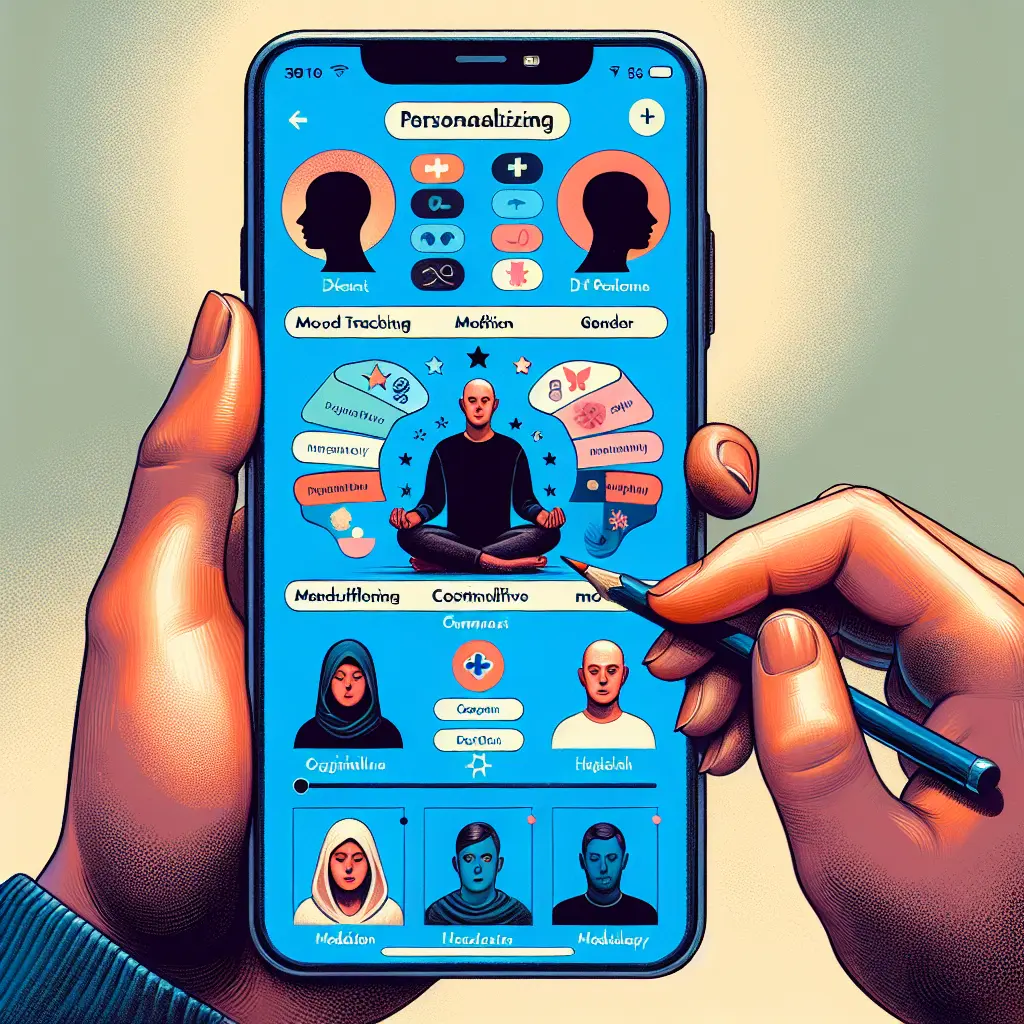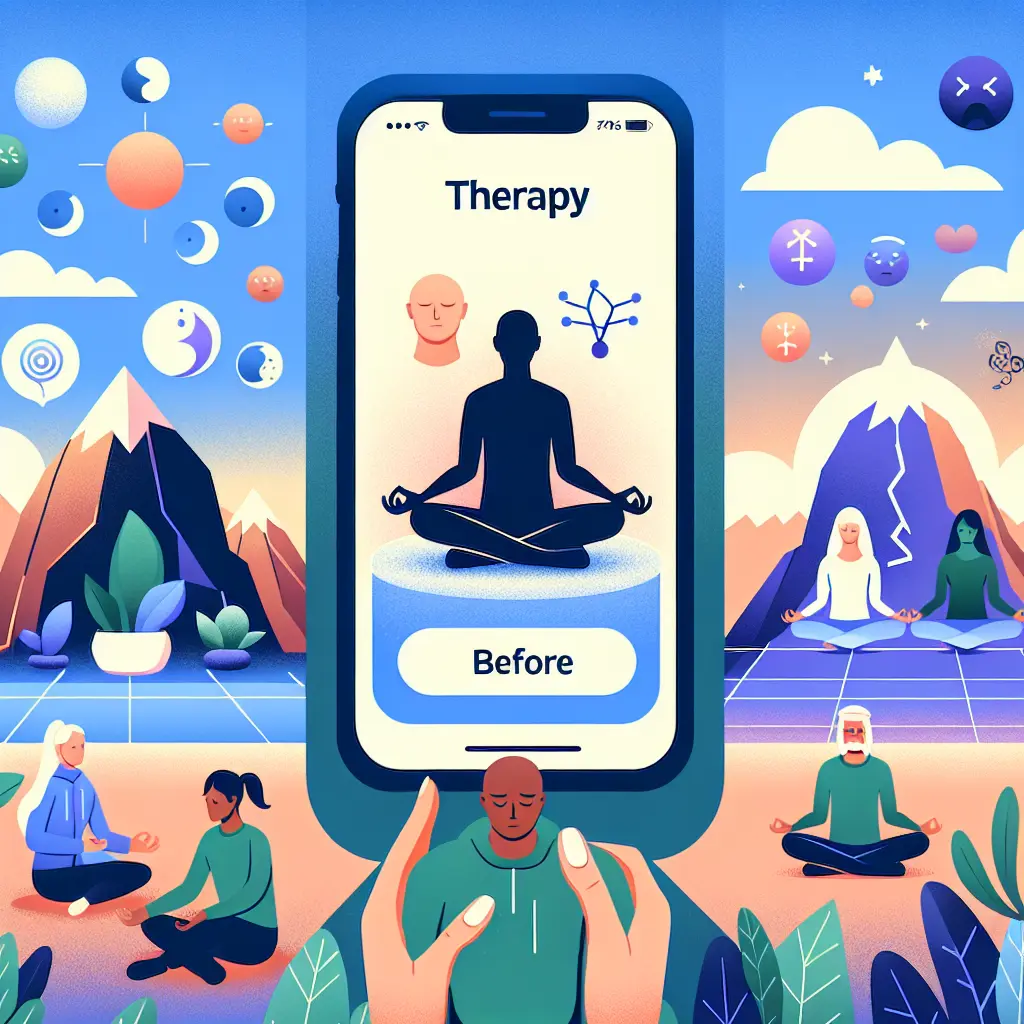In today's fast-paced world, mental health has emerged as a crucial component of overall well-being, prompting many to seek innovative solutions for their mental wellness journey. The rise of mental health apps has revolutionized how individuals approach mental health care, offering an array of customizable app features that cater to personal needs and preferences. Personalizing your mental health journey is no longer a distant dream but a reality made possible through the seamless integration of advanced technology and user-friendly interfaces.
These educational mental health apps are not just tools; they are partners in achieving personalized mental wellness. With adaptive mental health apps, users can embark on a journey of individualized mental health care, exploring customized therapy apps that offer tailored mental health solutions. Whether you're seeking personalized mental health support or interactive mental health education, these apps provide bespoke mental health strategies that resonate with your unique needs.
As we delve into the era of mental health app personalization, the emphasis is on crafting custom mental health plans that foster mental wellness apps customization. These personalized mental health tools are designed to empower users, transforming their mental health journey into an engaging and dynamic experience. By offering a range of mental health app features that adapt to changing requirements, these platforms facilitate mental health journey customization like never before.
This exploration into the realm of customizable mental health apps sets the stage for a deeper understanding of how these digital companions are reshaping mental wellness. As we transition into exploring specific features and benefits, it's clear that the future of mental health care is not just accessible but highly personal and adaptive.
Personalizing Your Mental Health Journey with Customizable App Features
The Rise of Personalization in Mental Health Apps
In a world where technology influences every aspect of our lives, mental health care is no exception. The integration of customizable app features has transformed how we approach mental wellness, making personalized mental health journeys more accessible and effective. Let's explore how these features are enhancing the way individuals engage with mental health apps education and the profound impact they have on mental wellness.
Recent studies highlight the growing demand for personalization in mental health care. According to a 2023 report by the American Psychological Association, there's been a significant increase in individuals seeking tailored mental health solutions through digital platforms. This shift is driven by the need for mental health journey customization that addresses unique personal experiences and challenges.
The trend towards personalized mental wellness is evident in the development of customized therapy apps. These apps employ advanced algorithms and machine learning to adapt to users' preferences and evolving needs, providing a bespoke mental health strategy that aligns with individual goals.
Key Customizable Features of Mental Health Apps
Case Studies Illustrating the Impact of Personalization
1. Adaptive Content Delivery: Educational mental health apps are incorporating adaptive content delivery mechanisms that adjust based on user interaction and progress. This ensures that users receive relevant information tailored to their current state of mind and learning pace.
2. Mood Tracking and Analysis: Many user-friendly mental health apps offer comprehensive mood tracking features. By analyzing mood patterns over time, these apps provide personalized insights and suggestions, fostering a deeper understanding of one's emotional landscape.
3. Interactive Mental Health Education: Apps like Headspace and Calm have revolutionized mental wellness apps customization by offering interactive modules that cater to different learning styles, whether through audio, video, or text.
Custom Mental Health Plans: Some apps, such as BetterHelp, allow users to create custom mental health plans with the guidance of licensed therapists. This feature empowers users to set specific goals and track their progress, enhancing their personalized mental wellness experience.
Case Study 1: Real-Time Adaptation in Therapy
A notable example of personalized mental health support comes from a study conducted by Stanford University in 2023. The study involved an app that provided real-time adaptation in therapy sessions based on user feedback and biometric data. Participants reported a 30% increase in therapy effectiveness due to the app's ability to tailor sessions dynamically.
Case Study 2: Engaging Young Adults Through Gamification
In 2022, a collaborative project between MIT Media Lab and various educational institutions explored the use of gamification in mental health apps for young adults. By incorporating game-like elements into interactive mental health education, the project saw a significant boost in user engagement and retention rates, demonstrating the power of tailored approaches in educational mental health apps.
Challenges and Considerations in Mental Health App Personalization
While the benefits are clear, there are challenges associated with mental health app personalization. Privacy concerns are paramount as these apps collect sensitive personal data to offer individualized mental health care. Ensuring robust data protection measures is crucial for maintaining user trust and engagement.
Moreover, the effectiveness of personalized mental health tools depends on the accuracy of the algorithms used to customize content and interactions. As highlighted in a 2023 review by The Lancet Digital Health, continuous refinement and validation of these algorithms are necessary to ensure they provide accurate and beneficial recommendations.
The Future of Personalized Mental Health Care
Looking forward, the future of mental health app features will likely see further integration of AI and wearable technology. Wearables could provide real-time data on physiological states, which, when combined with app analytics, could revolutionize how adaptive mental health apps personalize care.
Additionally, as societal awareness about mental health increases, so too will the demand for more comprehensive personalized mental wellness solutions. This will spur innovation in custom mental health plans and bespoke mental health strategies designed to address diverse populations across different cultural and demographic backgrounds.
Conclusion: Embracing a Personalized Approach
As we continue to embrace technology's role in our daily lives, personalized approaches to mental health care through customizable app features represent a pivotal step forward. By offering tailored support, these tools empower individuals to take control of their mental wellness journey, crafting a path that resonates with their personal experiences and needs. In doing so, they not only provide personalized mental health support but also contribute to a broader understanding of mental wellness in our fast-paced digital age.
Conclusion: Embracing Personalized Mental Wellness
In our technology-driven world, personalized mental health care through customizable app features is revolutionizing how individuals manage their mental wellness. As we've explored, several key points underscore the significance of this trend:
Adaptive Content Delivery: Mental health apps now tailor content to align with individual user interactions and progress, enhancing the learning experience.
Mood Tracking and Analysis: Comprehensive mood tracking provides personalized insights, fostering greater self-awareness and emotional understanding.
Interactive Education: Apps like Headspace and Calm use varied formats to accommodate different learning styles, making mental health education more engaging.
Custom Plans: Platforms such as BetterHelp empower users with tailored mental health plans, promoting goal setting and progress tracking.
The case studies highlighted illustrate the impact of personalization in boosting therapy effectiveness and engaging young adults through innovative techniques like gamification.
While these advancements are promising, challenges such as data privacy and algorithm accuracy remain critical. Addressing these issues is essential for maintaining user trust and ensuring the effectiveness of personalized mental health tools.
Looking ahead, integrating AI and wearable technology could further refine personalized care, catering to diverse populations across cultural and demographic spectrums.
As we continue to embrace technological innovations in mental health care, it's crucial to reflect on your own journey. How have customizable app features impacted your mental wellness? Share your thoughts and experiences—your insights could inspire others on their path to mental well-being.
Stay well and take control of your mental wellness journey. Your story matters.
Warm regards,
[Your Blog/Website]






Leave a Comment